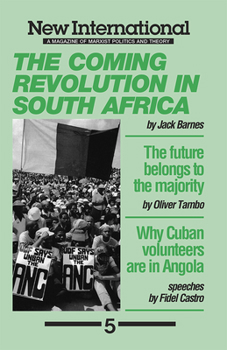The Coming Revolution in South Africa
The one-person, one-vote elections in 1994, and the sweeping victory of the African National Congress, were historic steps in the democratic revolution in South Africa. This article explores the... This description may be from another edition of this product.
Format:Paperback
Language:English
ISBN:0873486404
ISBN13:9780873486408
Release Date:January 1985
Publisher:New International
Length:334 Pages
Weight:0.53 lbs.
Dimensions:0.5" x 5.2" x 8.3"
Customer Reviews
3 ratings
culminación de la revolución democrática
Published by Thriftbooks.com User , 21 years ago
Fue necesario unir los campesinos y trabajadores -los víctimas del capitalismo- para llevar a cabo la revolución democrática en el país de Sudáfrica, en contra de los mismos capitalistas. Y no sólo fue una clase capitalista en su país, sino un imperialismo que extraía ganancias de muchos países del sur y centro de su continente.Parece irónico, pero así es el dilema del capitalismo en su fase imperialista actual. Sudáfrica era uno de los últimos ejemplos de lo que Lenín explicaba a principios del siglo XX en relación de los países sometidos al capitalismo (Imperialismo: la fase superior del capitalismo). Habiendo consumido su período revolucionario con la Guerra Civil de los Estados Unidos, de 1865 en adelante la burguesía ya no es capaz de ofrecer el liderazgo para ninguna revolución democrática en ningún rincón del mundo. Únicamente los campesinos y trabajadores pueden instalar las leyes de igualdad, con la burguesía esperando impaciente de regresar del margen para tomar el poder una vez consumidas las necesidades democráticas.Con Nelson Mandela de frente, el Congreso Nacional Africano impuso los mínimos de igualdad, y así acabó con un imperio pequeño pero tan brutal como el de Israel hoy en día. Sudáfrica sigue capitalista, pero ya no tiene segregación para extraer súper-ganancias.
What was apartheid? How was it defeated? What next?
Published by Thriftbooks.com User , 21 years ago
The main article in this collection, "The Coming Revolution in South Africa," by Jack Barnes, came out in the mid-1980s. The analysis presented was important as a guide to action for all those involved in the struggle to rid the world of the hated apartheid system in South Africa. Apartheid was a system that strangled normal capitalist development. A regime that resembled fascism, it treated the mass of the workers and farmers almost as slaves. Instead of a ruling capitalist class pitted against a working class (which is to be expected as a result of normal capitalist development), the apartheid system divided society into a white caste and a non-white caste, with Blacks, the majority of the population, stripped of nearly all democratic rights. The wealthy white elite fought to preserve apartheid because it secured their control over the Black majority, and thus magnified profit rates. But this form of control created explosive social pressures.In order to advance toward socialism, the working people in South Africa first had to destroy the apartheid structure and allow the pressures of capitalist development to emerge into the open. With the chains of apartheid broken, the masses of working people could then come to grips with a real capitalist system as such. The 1994 election which brought the African National Congress to power culminated a process of revolutionary change that was critical to all further development in South Africa and its neighboring countries. It opened the door to a new period of class struggle, preparing the workers in South Africa to participate, on an equal footing with workers in all countries, to build a new world free of capitalist war and depression.
Revolution to come
Published by Thriftbooks.com User , 21 years ago
Though published in 1985, nine years before the victory of the African National Congress against Apartheid, the main article in this book-length magazine Jack Barnes's "The Coming Revolution in South Africa," forecasts the way forward for the democratic revolution in South Africa and shows how the roots of a future socialist revolution in South Africa flow out of that struggle. Barnes, the national secretary of the Socialist Workers Party, explains why the democratic tasks of national liberation and unification advanced by the ANC and its allies were the correct way forward for the peoples of South Africa. With examples from the policies of Lenin and the Russian Bolsheviks and the Cuba and Nicaraguan revolutions, Barnes takes on sectarians who attacked the ANC because it did not have an explicitly anticapitalist program. Along with Barnes' speech, this issue contains "The Freedom Charter"--the political program the ANC advanced in the antiapartheid struggle -- "The Future Belongs to US" a Speech by ANC leader Oliver Tambo, a speech by Fidel Castro explaining why and how Cuba supported the freedom struggle in Angola, and a summary of the then latest stages in the South African struggle by Ernest Harsch.




